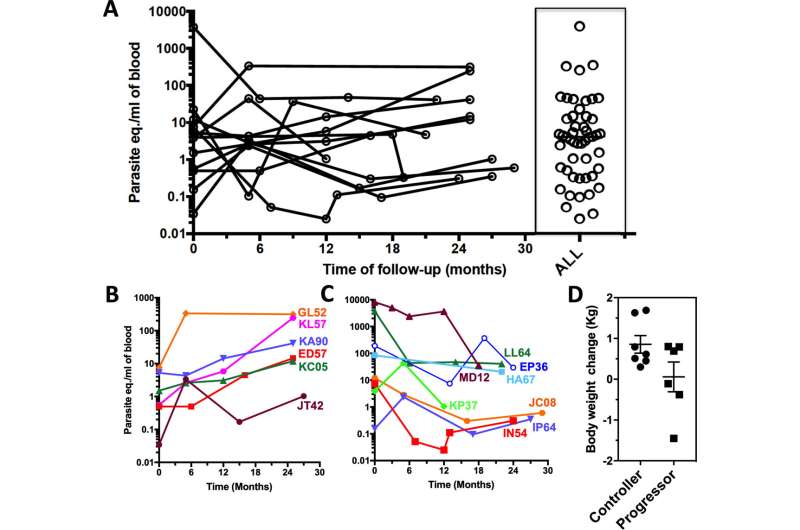This article has been reviewed according to Science X's editorial process and policies. Editors have highlighted the following attributes while ensuring the content's credibility:
fact-checked
trusted source
proofread
New Chagas research unravels decades-long mystery of how the tropical disease progresses

New research from Tulane University may shed light on how parasite strain diversity can impact Chagas disease progression and severity.
Chagas, a lesser-known and studied tropical disease, is caused by Trypanosoma cruzi parasites, which are transmitted by kissing bugs. In the Americas, the disease affects 6 million people in 21 countries, with approximately 30,000 new cases each year. While most infected patients remain asymptomatic, about 20%–40% of those infected will develop chronic heart disease years or decades after infection, and about 5 percent will develop digestive disease.
Treating Chagas patients is challenging because the disease progression is unpredictable, resulting in 14,000 deaths annually.
In a new study published in Microbiology Spectrum, Tulane researchers were able to establish a link between disease progression and parasite strain diversity. Rhesus macaques naturally infected with T. cruzi were studied for two to three years, and researchers found that those infected with mixtures of multiple strains were able to better control the parasite and stop the progression of the disease, while those with a progressive form of the disease had fewer strains.
"Since the 1980s, researchers have proposed that different strains could be associated with different disease outcomes due to the parasite's genetic diversity, but decades of research failed to uncover clear associations," said lead study author Eric Dumonteil, Ph.D., associate professor of tropical medicine at Tulane University School of Public Health and Tropical Medicine. "In finding a clear association, these results provide a new framework for the development of more effective treatments and vaccines."
Dumonteil said studies are ongoing to further understand the interactions of various parasite strains during infection.
The study was co-authored by Dumonteil, Hans Desale, Ph.D., Claudia Herrera, Ph.D.and Preston Marx, Ph.D., from the Department of Tropical Medicine. The research was conducted at the Tulane National Primate Research Center. Technical support was provided by medical research specialist Kelly Goff, Monica Shroyer and Weihong Tu. Nora Hernandez-Cuevas from the Autonomous University of Yucatan in Mexico collaborated in the study.
More information: Eric Dumonteil et al, Intra-host Trypanosoma cruzi strain dynamics shape disease progression: the missing link in Chagas disease pathogenesis, Microbiology Spectrum (2023). DOI: 10.1128/spectrum.04236-22



















